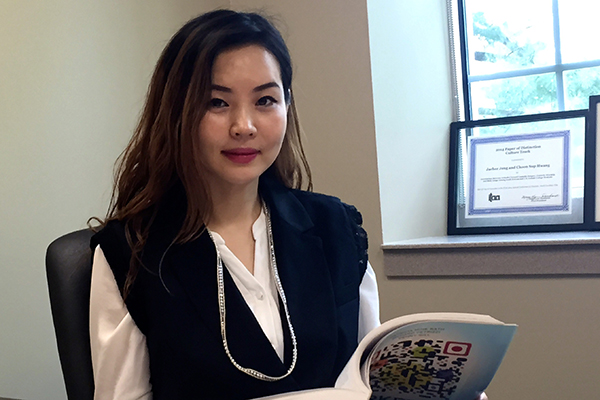


Cross-cultural counterfeits
Research explores reasons for buying fake luxury goods
12:08 p.m., May 18, 2015--Just as people from different cultures have different reasons for wanting luxury goods, they also have a variety of reasons for buying — or refusing to buy — counterfeit items, a University of Delaware researcher found in comparing German and Korean consumers.
Jaehee Jung, associate professor of fashion and apparel studies, is the co-author of a new paper that has been accepted for publication in Luxury Research Journal. She and co-authors from Leibniz University of Hannover in Germany and Kyung Hee University in South Korea studied consumer behavior in regard to genuine vs. counterfeit luxury goods, from handbags and shoes to cars and fine wine.
Research Stories
Chronic wounds
Prof. Heck's legacy
“We looked at the perception people have of counterfeit luxury goods and why they decide to buy them,” said Jung, who collected data for the study while on a sabbatical in South Korea. “Is price the only determinant of why people choose a counterfeit item instead of a genuine one? We thought that if price was the only reason, then everyone would buy counterfeits because they cost less.”
There must be other reasons than just price, she decided, and she suspected that those reasons would differ among consumers in different cultures and countries.
The research grew out of previous work Jung did exploring the perception of luxury goods in various cultures. That study, focusing on the purchase of genuine items, found that Americans buy such goods for hedonistic reasons of self-fulfillment while French consumers, for example, value the items because they are expensive and exclusive.
For the new study, the researchers gathered data from consumers in Germany and South Korea, both countries with large luxury markets — of both genuine and counterfeit goods. They found individual differences but also some similarities within countries.
“We found that people’s perceptions are what really determines the market for counterfeits, and we found cultural patterns,” Jung said. “German consumers want high-quality goods, and they worry that counterfeits won’t have the quality they desire. Korean consumers are more concerned about social perceptions and making a good impression on others. They worry that people will think less of them if they are known to buy counterfeits.”
Jung said those attitudes toward counterfeit items fit larger cultural patterns. Korean culture in general has a high level of social consciousness, while Germans, like Americans, put more emphasis on self-motivation.
The researchers hope to extend their cross-cultural work and examine counterfeit markets in countries such as China, India and Brazil, where demand for luxury goods is soaring.
The ultimate goal of learning why consumers will or won’t buy fake items is to create educational campaigns and other efforts to weaken the global counterfeit industry, which costs genuine manufacturers billions of dollars in sales and dilutes the value of their brands.
“There’s no shortage of demand for counterfeits, so developing prevention strategies is difficult,” Jung said. “What we’ve learned is that to have effective strategies, we have to be country-specific. Even being culture-specific isn’t enough; Korea is not the same as Germany, but it’s also not the same as China and other Asian countries.”
Article by Ann Manser
Photos courtesy of Jaehee Jung









